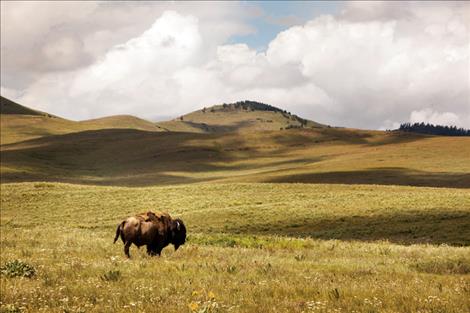Tribe seeks input on Bison Range transfer
Hey savvy news reader! Thanks for choosing local.
You are now reading
1 of 3 free articles.
Public comment is wanted by June 24 concerning the proposed transfer of the National Bison Range to federal trust ownership to allow the Confederated Salish and Kootenai Tribes to manage the refuge.
“The Bison Range is a treasure and, as good neighbors, we want to ensure that everyone is able to review and comment on the legislative language before it is finalized.” said Rob McDonald, spokesman for CSKT.
McDonald noted that U.S. Fish and Wildlife Service approached CSKT about the idea of restoring management of the range to the tribe in February.
“CSKT carried those discussions forward with the Montana Congressional delegation and local conservation groups, and drafted the legislative language now being made available for public comment,” he said.
Assistant Regional Director of External Affairs for the FWS Anna Munoz said the service is supportive of transferring the range in trust for the benefit of CSKT.
“The Service considers the CSKT to be experienced wildlife managers and well equipped to manage the lands and resources that comprise the National Bison Range,” she said. “They have one of the best tribal wildlife programs in the country and will provide for the continued conservation of bison within this area.”
The FWS works welcomes conservation assistance.
“We believe the transfer of these lands will allow for the continued conservation of the bison and other wildlife and natural resources supported by these lands while allowing the Service to focus our limited resources on other priority, landscape-scale conservation efforts,” she said.
The tribe created the Bison Range Working Group in an effort to collect public comment as they develop the draft legislation that will eventually be presented to congress where a majority vote is needed to pass the bill to make it law.
The draft legislation begins by saying that bison have been a part of Native American culture since “time immemorial” as part of their history, religion and way of life. It also explains that the Bison Range is in the middle of the Flathead Indian Reservation, and the current herd is descended from bison that roamed on the reservation established by tribal members before homesteading began.
The legislation states that the lands, bison and other resources will continue to be protected on the range as part of the reservation under the laws and regulations applicable to Indian trust lands.
Lands, buildings, and structures would remain in federal ownership but be put in trust for the tribe at the time of enactment of the legislation if it passes. The U.S relinquishes all interest in the bison on the land to the tribe as managers of that trust.
Maintaining the range includes naming the lands as stated in the document but the tribe added that the transfer also requires public visitation and education opportunities. The U.S. government is to provide liability insurance as long as public visitation is required, according to the document.
The tribe’s legislation also addresses the loss of revenue to Sanders and Lake Counties from the range. The FWS is under a revenue sharing act that puts 25 percent of the net receipts collected from public domain land into the counties where they are located.
It says in the legislation that in order to reduce impact on those two counties where the range is located, the U.S. government shall make payments to those counties for five years. The first year consists of 90 percent of what the counties would have received, the second year would be at 75 percent, and the third to fifth years would be at 50 percent.
The document also makes clear that it doesn’t set a precedent for any other similar situation to occur by law regarding federal land.
FWS Director Munoz addressed the issue of employment at the range if the transfer occurs. “All employees of the National Bison Range will continue to be employed by the U.S. Fish and Wildlife Service and we will be working with each of them to ensure that their transition to a new position is as seamless as possible,” she said.
Opposition to the transfer came about in the form of a federal lawsuit filed in late May by Public Employees for Environmental Responsibility. PEER is joined in the suit by former refuge managers and employees of the Bison Range. They claim that the FWS needs to do an environmental analysis before sponsoring the legislation to turn the range over to the tribe. The lawsuit was filed before the tribe released the draft legislation.
“The law requires federal agencies to think through the consequences of proposals before launching them,” said PEER Senior Counsel Paula Dinerstein in a press release. It was added in the release that she brought the litigation that struck down a joint management plan between the FWS and CSKT in 2010.
Draft bill language is available along with more information at BisonRangeWorkingGroup.org.
Comments are being collected until June 24 at noon through the submission form on the website or email at BisonRangeWorkingGroup@gmail.com. Once the submission period is closed, the tribe will release a summarized report of the collected comments.
















